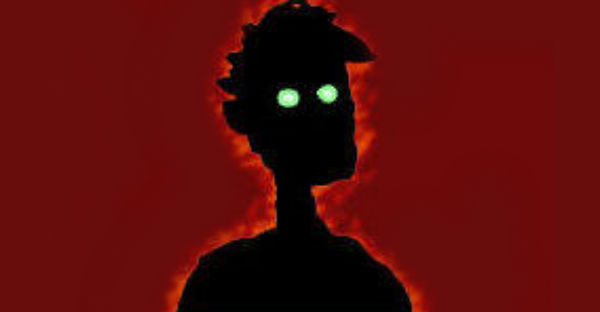The Black Lady of Brin Tor is a Victorian ghost story, written in 1904 by Guy Boothby. The story concerns a married couple who move into a new house and find a strange woman in a black veil trespassing on their property.

The Black Lady of Brin Tor
I have seen some curious sights, and have taken part in some equally curious affairs, in the course of my career, but I can safely assert that the story I am going to tell you now equals, if it does not excel, anything I have ever known.
I had just come from South America, where I had been ranching for a good number of years, and, having been more successful than the majority of men who go in for that occupation, had returned to the Old Country with the intention of making it my home for the remainder of my existence.
If you are prepared to spend the money it would not seem difficult to find a house of the description you require. Yet only those who have tried it know what a serious business it can be. One will be too large and without sufficient land, another too small and with more land than you care to be bothered with. My wife and I visited innumerable places, and at last were beginning to despair ot ever finding what we wanted. Then, quite by chance, I happened to hear of the property with which this story is connected.
It was necessary for me to visit Plymonth in order to meet a friend who was returning from Australia. The beauty of Devon is proverbial, and never prettier than in the autumn. After my long absence abroad, it had a charm for me that I find it difficult to express in words. The dark red soil, the luxuriant hedgerows, the babbling brooks, and the vast solitude of Dartmoor appealed to me with overwhelming force. This was the county for me, if only I could find the place for which I had been so long and wearily searching.
While I was awaiting the arrival of my friend’s vessel, I made it my business to call on one of the leading house agents in order to make enquiries. Alas for my hopes! He had nothing on his books that I cared even to consider. I tried another, and yet a third, but with the same result. There were houses in plenty in the town, but they were useless; there were others in the immediate neighbourhood, but each had some drawback. I bade the last agent “Good afternoon,” and returned to my hotel very disappointed with my ill success. That evening my friend arrived and, in the pleasure of welcoming him, I forgot for the time being my quest of a residence. I was nearer success, however than I imagined.
On descending to the coffee-room next morning I found a letter upon my plate. It was from the first agent upon whom I had called on the previous day. Quite by chance, he stated, he had happened to hear of an estate situated in a charming little village on the edge of the moor. The house was an old and picturesque one, and the property consisted of some seventy acres. Some slight repairs would have to be effected, for the reason that the house had not been inhabited for some considerable time, the owner being abroad and unable to keep it up. In conclusion it was stated that the estate would be either let on lease or sold outright. I carefully studied the particulars enclosed, and, as I did so began to feel that it really looked as if I had discovered what I wanted. When my friend descended I told him the news, and invited him to remain a day longer in order to come out with me and inspect it. He consented to do so, and that afternoon we chartered a carriage and drove out.
There are reasons why I suppress the name of the village. They will, I expect, be obvious to you. Give a dog a bad name and hang him, may apply as well to a property as to the canine race.
The Hall, as the place was called, was on the further side of the village, and was on the very edge of the moor. The agent had described it exactly when he had declared it to be a picturesque old building. It stood on high ground, and immediately behind it rose the steep side of Brin Tor, crowned with enormous boulders that gave it a strangely wild appearance. The house itself was approached by a lengthy carriage drive, and, as I learnt later, had been built in the days of George the First. From the first moment that I saw it I liked it. We drew up at the steps and alighted.
I presented the housekeeper with the order to view, whereupon she examined it as if it were a banknote, for a thousand pounds, and she was not quite certain as to whether it was genuine. At last, however, she condescended to admit us, and we entered the large, square hall. It was paved, and I must confess did not present a very inviting appearance. The oak panelling, however, was handsome, while the grand staircase was massive and finely carved. With no very good grace the old woman threw open the door of the room which I judged to be the dining-room; thence we proceeded on our tour of investigation. The house, with the exception of the kitchen and a bedroom, was quite unfurnished, and certainly stood in need of repair. It possessed, however, great possibilities and I felt sure that when furnished and put in proper order it would make a charming dwelling. By the time our inspection was finished, the afternoon was well advanced and, if we desired to get back to Plymouth in time for dinner it behoved us to start at once.
That evening I wrote a long description of what I had seen to my wife, inviting her to join me in order that I might have her opinion. Next day she arrived. She proved to be as charmed with it as I was and by the end of the week following matters were in excellent trim for my becoming its owner. As soon as the necessary legal formalities had been complied with, my wife set off for London on furniture-buying thoughts intent, while I remained behind to hurry on the work that had to be completed before we could come into residence. At last – it was the second week in November, if my memory serves me — the furniture began to arrive. A makeshift bedroom was prepared for me, and I exchanged the hotel in Plymouth for my own abode.
For the next few days my life was not altogether a bed of roses. Everything had to be arranged, the servants were new, while the furnisher’s men required strict supervision to prevent them spending the greater part of their time, at the village inn. However, it was all done at last and I felt that when my wife gave it the few finishing touches, which only a woman can do, it would be as nearly perfect as a man could wish to have his home.
It was on the day that my wife arrived that the first curious circumstance ocurred which it is the purpose of this story to relate. We had finished dinner and were in our drawing-room discussing affairs in general and wondering when the butler was going to bring in coffee.
“I told him we would have it immediately after dinner.” said my wife.
I rang the bell and almost immediately he appeared in answer to it. He looked round the room in surprise, as if he expected to find a third person present.
“We will have coffee, Simpson,” said my wife. “Always let us have it as soon after dinner as possible.”
“You will excuse me, madam, but I thought you were engaged with a lady.”
“I have seen no lady.”
He looked at her in bewilderment. “A lady came up the hall,” he said, “just as you left the dining-room, and I thought she came in here.”
I looked at the man sharply; apparently he was sober.
“You must have dreamt it,” I continued.
“No. sir, I am quite sure I did not. I saw her quite distinctly, and would know her again anywhere. She seemed in great trouble, so that is why I did not disturb you. I am very sorry, sir.”
He departed to bring in the coffee. When he returned I asked him to describe the person in question more minutely. I gathered that she was tall, and had a beautiful face, but with a very sad expression. She was dressed entirely in black, and had what he called, “a black lace shawl” upon her head. The man was deeply in earnest, but I could make neither head nor tail of it.
“Let us look round.’ I said. “I am quite sure that the hall door has not been opened since dinner, and if she is in the house now we shall doubtless find her.”
Accompanied by my wife we set off and visited all the rooms on tho ground-floor, not omitting the servants’ hall. My wife questioned the maids, but one and all asserted that they had not been into the hall since dinner. We next tried all the rooms upstairs with the same result. Simpson’s mysterious black lady, if she had existed, was certainly not in the house. I felt more than ever convinced that the man must have fallen asleep in his pantry and dreamt it. But we were not done with her yet. A week or so afterwards, and when we were quite settled in, one of the maids who had been down to the village declared that on a path that led through the shrubbery to a side gate she had met a lady who seemed in great distress. According to the girl’s story, she was wringing her hands. It was too dark for the maid to see her face.
“You are quite sure of what you are saying?” I asked, when Simpson brought the girl into presence.
“I am quite sure, sir,” was her reply. “I held the gate open for her to pass through.”
“Did she speak to you?”
“Not a word, sir! She just went by me as if she did not see me.”
“This is really one of the strangest things I ever heard,” I said to my wife when we were alone together. “I wonder who the woman is, and by what right she trespasses on my grounds? It I meet her, I shall put the question to her.”
Chrisimas was now drawing near, and we had invited a large house party to spend the festive season with us. Among the number was a young fellow named Desborough, who had just got his troop in a Lancer regiment. We had placed him in a room in the bachelors’ wing, which was the oldest portion of the house. He and I were the two first to reach the drawing-room before dinner.
“I say, old man,” he began, “how many people have you got in the house?”
I told him.
“Yes, but who is the other one – the lady with the sorrowful countenance, and a jolly pretty one at that?”
“There is no one else,” I replied. “I have given you the names of all of them.”
“Well, that’s funny. For I’ll swear she was no housemaid, and I’ve seen your wife’s maid. Are you sure you are not rotting me?”
“Perfectly sure. Describe this mysterious individual to me.”
“Well, I’m not much of a hand at that sort of work, but I know that she was jolly good-looking. with what looked like a lace mantilla on her head, and she seemed to be in rare trouble. She was wringing her hands and looked so sorrowfully at me that for a moment I was almost tempted to ask her what was the matter.”
“Wait here a moment,” I said. “I’ll run upstairs and see if I can discover who this person can be.”
I did so, muttering as I went that I was getting a little tired of the lady’s visits to my house. But though I searched the bachelors’ wing and such other rooms a.s I could enter no trace of her could I discover. I returned to the drawing-room and informed Desborough of my ill success.
“Well, you can say what you like,” he answered. “I saw her plainly as I can see you now.”
Thus the matter dropped for the time being.
My wife was the next to be favoured with a glimpse of her. It wae Christmas Eve, and the ladies had been down to the church to decorate the edifice for the next day. It was almost dark when they started to return. My wife remained behind the party for about ten minutes to discuss certain matters with the Vicar. It was snowing heavily when she left the church, and the country looked indescribably beautiful in the light of the full moon. Her version of the story is that she had just left the shrubbery and was passing along the path that ran at the foot of the Terrace when she looked up and saw a woman, dressed in black, leaning with her hands upon it, looking down at her. She declares to this day that she was too surprised to be frightened, or to say or do anything. Then the woman walked away from her, wringing her hands as if she were in great grief. Three minutes could not have elapsed before I had been told, and was out on the Terrace in pursuit. I looked about, but there was no sign of her, and, stranger still, there was not a footmark other than my own upon the snow. The matter was getting beyond me. I could not make head or tail of it.
Next day, after the morning service, I took the Vicar aside and asked him if he could give me any clue to the mystery. I told him the matter was getting serious. The servants declared that it was a ghost, and, in consequence, were threatening to leave me.
“Well, I will not deny,” he said, “that something of this sort of thing has been village gossip for a great many years, and more than one person has laid claim to having seen it. Personally, I have never done so. The story goes that it is the spirit of a Spanish woman who was once the mistress of the house. If you will come into the church again I will show you a tablet to her memory.”
I followed him, and discovered the inscription in question. It described her (for reasons already stated I will not give her name) as being the wife of the owner of tho house, and also set forth the fact that she had died in the year 1782.
“There’s not much to be gained from that,” I said. “But the coincidence is, to say the least of it, singular.”
I then thanked him and rejoined my party.
That evening was devoted to the usual amusements associated with the season. I am afraid we are all very juvenile, and must have shocked the grave Simpson. We playod Dumb Crambo, acted Charades, and at last came to Thought Reading. In my turn, I went out of the room while an experiment was preparing. The hall was brilliantly lighted, and I give you my word that I had no thought of the mysterious lady at that moment. Suddenly I looked up to see her passing along the corridor at the top of the great staircase in the direction of the bachelor’s quarters.
Seizing a hat and coat, I ran up the stairs just in time to see her turning the corner of the corridor. I set off in pursuit. She was evidently making her way to a little door that led by a flight of steps to the garden below. By the time I reached it she had disappeared. But throwing open the door I saw her passing swiftly along the garden path towards the shrubbery. Donning my hat and drawing on my coat, I continued my chase. She passed out of the wicket gate and turned into the narrow lane that led towards the Tor. It was the night of full moon, and was almost as light as day. Without leaving any track upon the snow, she sped on at such a rate that I had great difficulty in keeping her in sight.
At last she reached the foot of the Tor and began the ascent. This was more than I had bargained for, for it must be remembered that my feet were in evening dress shoes amd that snow was lying inches deep upon the ground. However, having come so far, I was determined to see what the end of it all would be. Staggering, falling, I began to climb, the black figure speeding on ahead of me, never pausing for a moment. At last it reached the summit and stood, while perhaps I could have counted twenty, upon the topmost boulder. It made a weird picture, I can assure you. Then she raised her arms above her head and fell through the air to the rocks nearly two hundred feet below. On my honour, it was so real that I gave a great cry as I saw it. I scrambled down to see if there was any sign of her, but there was none. The tragedy ended with her death. I went home scarcely able to believe the evidence of my senses.
Next day, I took Desborough up the Tor with me and described the scene to him. I believe he thought I had dreamt it all. We stood at the foot and looked up at it.
“By Jove! It would be a ghastly place to take a leap from.” he said. “Is that a cave up there?”
He pointed half way up the face of the cliff. There certainly was a cave there.
“Perhaps that is the clue to the mystery,” I cried. “A man could be lowered to it from the top. As soon as the snow goes I’ll have a look at it.”
A week later, I took several of my men and a strong rope and visited the Tor once more. After having taken every precaution, they lowered me over the cliff till I reached the narrow entrance to the cave. I managed to squeeze myself in and then lit a candle which I had brought with me. Three steps took me into a fair-sized cavern, and showed me as strange and terrible a sight as man has ever looked upon. Stretched out upon the floor was the skeleton of a man; scattered round him were remains of books and what might once have been a blanket. I took up one of the books, and inside the cover found the name of the man whose wife’s tablet I had seen in the village church on Christmas Day. Later on, I examined it carefully.
Inside was written: “I am dying of starvation. They will not let my wiTe bring me food. I have destroyed the papers. Farewell, my beloved wife.”
Thus the mystery was solved. The poor remains were, brought down from their long resting-place and decently interred. Since then, the Black Lady, as the village folk call her, has not been seen. I do not pretend to account for it. I simply give you the story.







that was waaaaaaaaaaaaaaaaaaaaaaaaaaaay too long of a story, I fell asleep 5 times tryin’ to read it!
The title…It sounds so racist!
Good story, though. :)
nice story
4th. love the time ere it took place in, Victorian ere legends are so interesting!
What a long story but I love it.:) Merry Christmas to you, SFK!
What a long story, but nice though :) Merry Christmas to you, SFK!
first. it was a nice one.